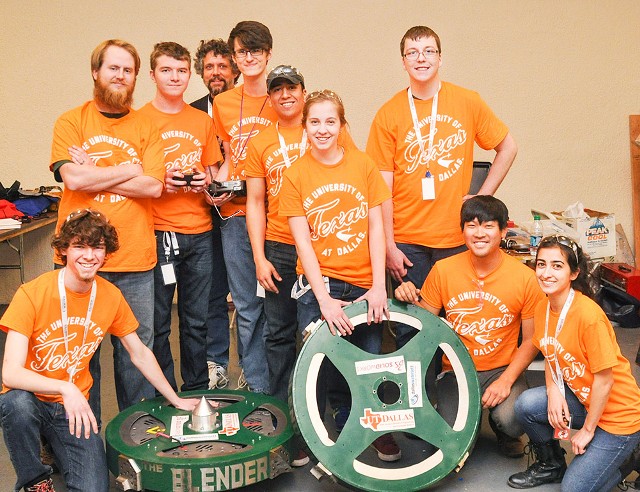Jul 27 2015
Stuart Yun BS’13 and Alex Kollaja BS’13 took a week off work and drove 360 miles battling Los Angeles and San Francisco traffic to assist current UT Dallas students competing in the 2015 Robogames, the world’s largest robotics exposition, in Northern California.
 The UT Dallas battlebot team won its first national title since 2011 and finished third internationally at the 2015 Robogames. Champion combat robot the Blender is joined by the team's advisor, alumni and members. They are (back row, from left) Aaron Plauche, Jack Doan, team advisor Dr. Matthew Goeckner, Jeremiah Plauche, Alejandro Hernandez, Haley Abitz, alumnus Alex Kollaja and (front row, from left) Brian Cash, alumnus Stuart Yun and Nusha Laleh.
The UT Dallas battlebot team won its first national title since 2011 and finished third internationally at the 2015 Robogames. Champion combat robot the Blender is joined by the team's advisor, alumni and members. They are (back row, from left) Aaron Plauche, Jack Doan, team advisor Dr. Matthew Goeckner, Jeremiah Plauche, Alejandro Hernandez, Haley Abitz, alumnus Alex Kollaja and (front row, from left) Brian Cash, alumnus Stuart Yun and Nusha Laleh.
“Both Alex and I were communicating with the battlebot crew over the course of two years,” Yun said. “We wanted to get to know the new team and help them out at the competition.”
Nusha Laleh, a mechanical engineering senior in the Erik Jonsson School of Engineering and Computer Science and UT Dallas battlebot team leader, credits the alumni’s input and the team with helping UT Dallas reclaim the title as national battlebot champions. The team, which also won the national title in 2007, 2009 and 2011, placed third in its class internationally, behind two squads from Brazil.
UT Dallas’ competition weapon is a 120-pound combat robot known as the Blender. The design of the robot is classified as a full body spinner, where a 70-pound titanium shell spins four hardened steel blades that slice at more than 120 miles per hour. The Blender’s competitors are known to last only seconds, or are knocked out with a single stroke.
After watching a round of explosions and listening to the thuds and clashes from the bulletproof arena in which the Blender competes, team members have to make needed repairs between battle rounds. This year that meant five rounds of competition — four breaks to make needed repairs.
“If your weapon doesn’t get destroyed and you’re not eliminated, you have to rebuild right before your next round, and that could be as little as 40 minutes,” Laleh said. “It got really intense. That’s where our alumni came in handy. They definitely helped us out a lot.”
Yun attributes the group’s victory to many factors.
“The group knew what they were doing,” he said. “Watching the team work was like watching the pit crew of a Formula One racing team.”
Dr. Matthew Goeckner, a UT Dallas professor and the team’s advisor, said the alumni’s help was just one example of how this year’s team formed a community.
“They did well because they are an excellent group of students and functioned as a team,” he said. “They communicated consistently, listened to each other, they worked well together. The good places to work in engineering function this way. These students are a shining example of what is best with UTD.”
The team typically competes every other year in the international robogames. The first year is dedicated to raising the funds needed to optimize the Blender, and the second year for fabricating the needed parts.
This year, Laleh was the only returning member of the team. She was on internship for much of the year typically spent fundraising, but she said the team made up that time by working long hours and each member taking on a technical area, and sharing that knowledge with the others.
Yun also noted that most of the team members were freshmen.
“Knowledge transfer was vital to success for competitions and the future,” he said. “Alex and I shared our collective experience for the Blender, battle strategy, undergraduate experience at UT Dallas and our professional life.”
Laleh said that network created — through alumni and sponsoring organizations such as the Jonsson School and Dallas Water Jet — was a natural byproduct of working so closely together.
Laleh, who is graduating in August, said that being a member of the team has been instrumental in her professional career.
“Being a battlebot member definitely opens doors,” she said, describing how she shows 20-second clips of the Blender in action during interviews. “Within 20 seconds, the interviewer is already intrigued at what I do. It’s amusing, and everyone loves explosions so it works to your advantage.”
Laleh has had four internships and multiple job offers.
“Battlebots involves technical skills, along with financial, marketing and leadership,” she said. “It makes you the most well-rounded individual.”
Yun agrees that being a team member can benefit a student professionally.
“The Blender is in good hands,” he said. “The UT Dallas battlebot alumni are currently doing very well professionally, partly due to the experience gained from the program. I am proud to say that every member who has been in the group has gotten at least one national title. This is something they can be proud of for the rest of their lives.”